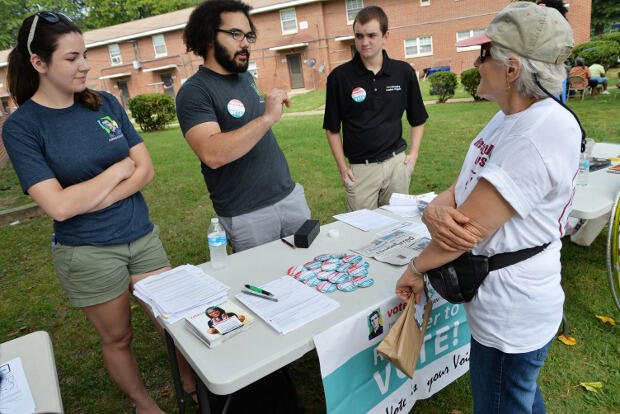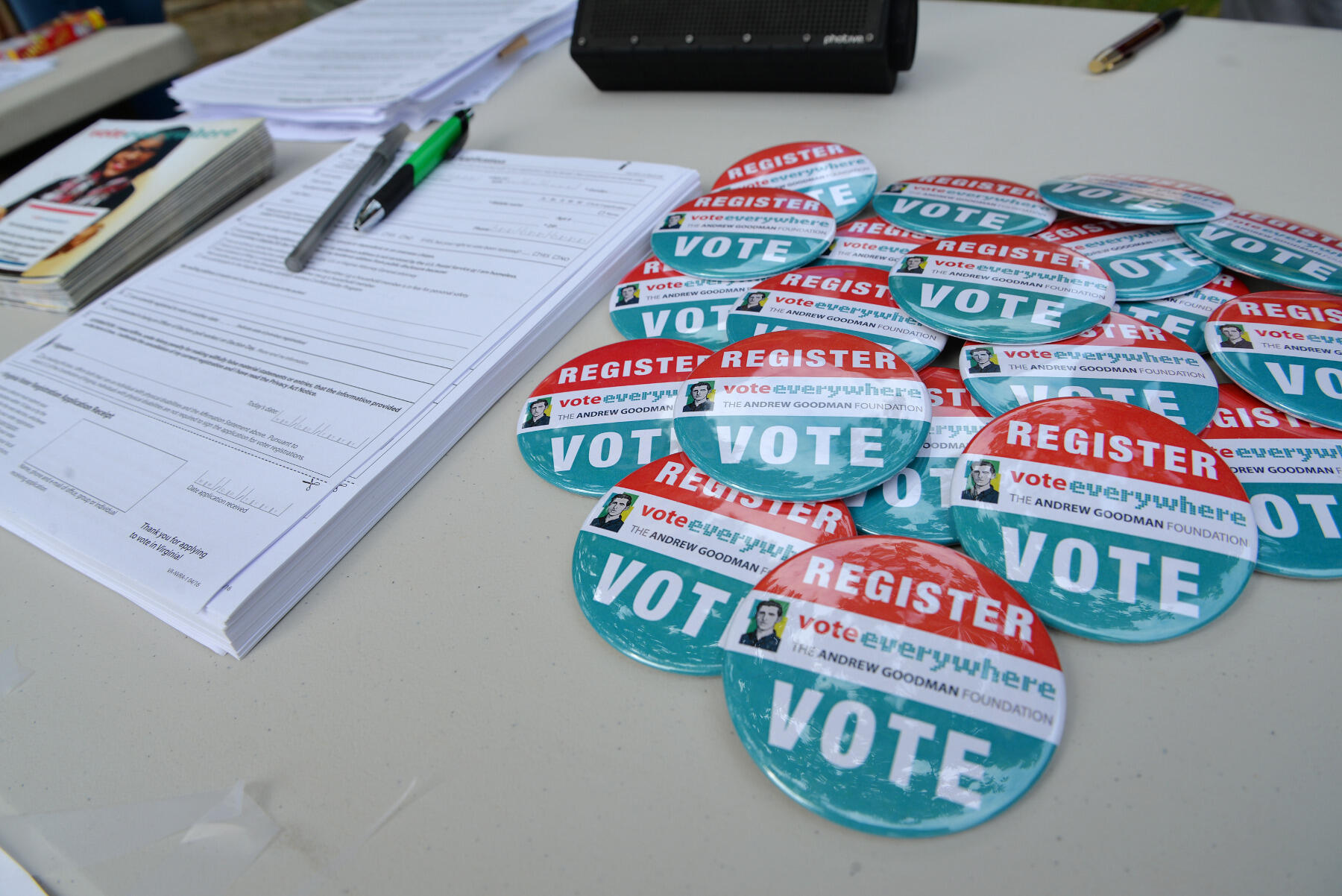
Sept. 14, 2016
As presidential election approaches, VCU students seek to register to vote classmates, disenfranchised populations in Richmond
Share this story
At a table loaded down with stacks of voter registration forms at the Mosby Court public housing development on Saturday, Virginia Commonwealth University student Anthony Jones is encouraging residents to get registered and vote in the upcoming presidential election.
“What’s up my man, you want a button?” he asks a young boy who has wandered over, curious about what’s going on. “We’re out here registering people to vote. We don’t care who you vote for, just that you get registered and vote for somebody.”
Jones, a junior sociology and international social justice double major, and Camilla Harris, a sophomore international studies major, are working this semester as part of a grant from the Andrew Goodman Foundation to promote election engagement among VCU students and disenfranchised communities in Richmond.
“Our goal is to register both millennials, college-aged students to get them engaged in the electoral process, as well as underrepresented communities — that’s low socio-economic status families, that’s people who have been disenfranchised,” Jones said.
Jacqueline Smith-Mason, Ph.D., associate dean and director of academic affairs for the Honors College, was the recipient of the grant from the foundation’s Vote Everywhere program. Vote Everywhere aims to recruit, train and support emerging leaders at America’s colleges and universities, and for the students to strengthen democracy by leading long-term voter engagement, public policy and social justice initiatives.
Research indicates that voting is habit forming.
“Research indicates that voting is habit forming. For instance, if an individual begins to vote at an early age, there is a greater likelihood that individual will continue to participate in elections throughout their life compared to those who do not,” Smith-Mason said. “As a result, it is important for our students to find issues that resonate with them and learn how their vote can have an impact on local, state and federal elections.”
As part of the grant, Jones and Harris — both students in the Honors College — have been tabling in the University Student Commons, visiting classes, and participating in student organization fairs. They have also been working to set up a mock debate between the Young Democrats and Young Republicans.
Jones and Harris are also working with the Daily Planet to address voting among Richmond’s homeless population. And they are collaborating with the ASPiRE Living-Learning Program — part of VCU’s Division of Community Engagement — to do voter outreach at Mosby Court, such as Saturday’s event, at which ASPiRE students ran children’s activities and played with local children, and also at which VCU’s Center for Health Disparities provided health information and handed out coloring books to children.
Nannette A Bailey, community partnerships coordinator for ASPiRE, said the VCU community outreach at Mosby Community Day promotes community pride, participation, unity and relationship building.

“We have had a mutually beneficial partnership with Mosby for five years,” Bailey said. “ASPiRE's first co-curricular activity was volunteering at Mosby's annual Community Day. We play an important role in Mosby's get-out-the-vote efforts. This [was] the first of the voter related activities. The other activities include a voter education event and an event to increase voter turnout.”
At Mosby Community Day, Jones and Harris did more than just register people to vote. They also provided information on the latest efforts to restore voting rights to felons who have served their sentences.
“I was very fortunate to meet one of the 13,000 [Virginians who had voting rights restored by Gov. Terry McAuliffe],” Jones said. “It was a very special moment for me. Just because this was someone who previously thought they would never be allowed to engage in the electoral process, and is now able to have their voice heard. It just lit me up.”
“We are fighting to raise awareness that there is a very serious movement to restore voting rights,” he added. “The governor is very serious about getting rights restored. So we explain [to residents] what that process looks like, who can apply for it. We have voter rights restoration request forms here today.”
As part of the Vote Everywhere program, the team is also working with the VCU Student Leadership and Involvement Center to possibly arrange transportation for VCU students to polls on Election Day.
Also this semester, Marcus Messner, Ph.D., associate professor of journalism in the Richard T. Robertson School of Media and Culture, is teaching a VCU Votes campaign course in which students will encourage voter participation via social media.
“The students are in the process of designing social media campaigns to get students to register to vote and to then go to the polls,” Messner said. “We are currently developing that campaign, which will launch later this month and will be accompanied by on-campus campaigning as well. A main focus will be on a Snapchat campaign, but we will also campaign on Facebook, Twitter and Instagram.”
Cove Soyars, a junior bioinformatics major in VCU Life Sciences, took part in the voter registration efforts on Saturday, volunteering through VCU’s Emerging Leaders Program in the Division of Student Affairs. He wanted to get involved, he said, because he believes that society only gets better when everyone has a voice.
“I’ve always thought it’s important for people to be involved in democracy — without people, it doesn’t work,” he said. “It’s government by the people.”
Subscribe to VCU News
Subscribe to VCU News at newsletter.vcu.edu and receive a selection of stories, videos, photos, news clips and event listings in your inbox.












